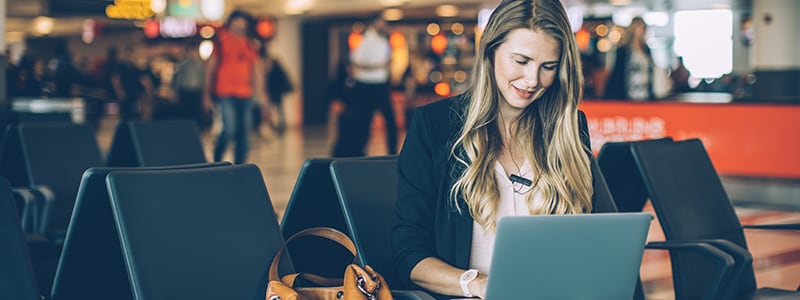Travel tips for staying safe on public Wi-Fi
Travel used to mean getting away from it all. Public Wi-Fi and mobile devices now keep us connected 24x7. But unsecured public Wi-Fi is risky. Learn how to stay safer on public Wi-Fi while traveling.

While traveling safely once meant simply securing your passport, now we must protect our online selves. Think of your mobile devices as your online passport. You’d never leave your passport laying around, giving access to your personal identity. But exposing your private information and identity is exactly what you do when you use your devices on unsecured public Wi-Fi.
Here are three top spots you’re likely to spend some of your travel time, and how-to tips for using public Wi-Fi with caution at each one.
Airports
If you’re flying to your destination, you may plan on catching up on emails or posting your status on social media. Some airports offer free, time-limited Wi-Fi, but whether it’s secure is always an unknown. When a Wi-Fi hotspot is unsecured, that means your data is unprotected. Anybody on the same network could spy on your information. If you do decide to use free public Wi-Fi, be careful about the types of sites you visit. It’s safest not to log in to any sites that require a password, because hackers could be using software kits to capture yours. Avoid any websites that hold any of your sensitive information, like banking sites or transactional sites on which you store credit card information.
Cafes and coffee shops
Besides offering us a caffeine boost, cafes are also good spots for us to charge our devices and catch up with our social networks while traveling. Most cafes offer free Wi-Fi network access when we purchase a cup of java. Unfortunately, even supposedly secured, password-protected networks aren’t necessarily safe for use.
Coffee shops are havens for hackers who want to snoop on your online activities. Using widely available tools, hackers can launch Man-in-the-Middle (MitM) attacks to get in between point A (your device) and point B (a website) to intercept any information. Without a virtual private network (VPN) like Norton VPN to encrypt your information, your social media logins, bank account credentials, and credit card numbers could be stolen easily.
Hotels
You’ve made it to your destination and are ready to start unwinding, but don’t get too relaxed about using your hotel’s Wi-Fi. As with airport Wi-Fi, hotel hotspots are not always secure — even with a password. After all, hotels specialize in hospitality, not information security. There’s no guarantee that the person who set up the Wi-Fi network turned on all the security features. And when patches for vulnerabilities are released for popular hotel routers, it may take a while for those patches to be implemented.
When checking in, be sure to get the official name of the hotel’s Wi-Fi. Even then you should still be cautious about using the hotel Wi-Fi, unless you have a VPN. Browsing online for restaurants or local tourist attractions will be low-risk activities without a VPN, but it will be a good idea to avoid logging in to any sensitive online accounts.
5 tips to reduce your risks on public Wi-Fi
Your travel itinerary shouldn’t include having your identity stolen on public Wi-Fi. With Norton VPN, a new multi-device VPN service that makes your public Wi-Fi connections private and secure by encrypting your information, you won’t have to worry about your private information being spied on.
If you don’t have access to a VPN but still need to use public Wi-Fi during your travels, remember these tips to protect your data and devices as much as possible:
- Start by selecting the most secure settings on your PCs, Macs, smartphones and tablets. Turn off any features that will automatically connect your device to any available Wi-Fi network. While you’re at it, turn off your Bluetooth unless you need to use it.
- Change your passwords before you travel. If you think you’ll need to log in to accounts with sensitive information — like social media, banking, or email accounts — switch to new, complex passwords before you leave, and then change them back when you get home.
- Be sure to update your software and apps. We’ve all been guilty of ignoring updates. However, most software updates are released because they offer fixes for newly discovered vulnerabilities. You could also add security software to your devices, such as Norton Mobile Security, which warns you of suspicious apps before you download them.
- Avoid logging in to any online accounts that store any of your sensitive information. That list could be long if you think about it: retail websites, health provider sites, banks or other financial institution sites, email, and social media.
- If you do surf online, make sure the URL of the website you’re visiting starts with “HTTPS” because the “S” stands for secure, and data is encrypted.
Editorial note: Our articles provide educational information for you. Our offerings may not cover or protect against every type of crime, fraud, or threat we write about. Our goal is to increase awareness about Cyber Safety. Please review complete Terms during enrollment or setup. Remember that no one can prevent all identity theft or cybercrime, and that LifeLock does not monitor all transactions at all businesses. The Norton and LifeLock brands are part of Gen Digital Inc.





Want more?
Follow us for all the latest news, tips and updates.